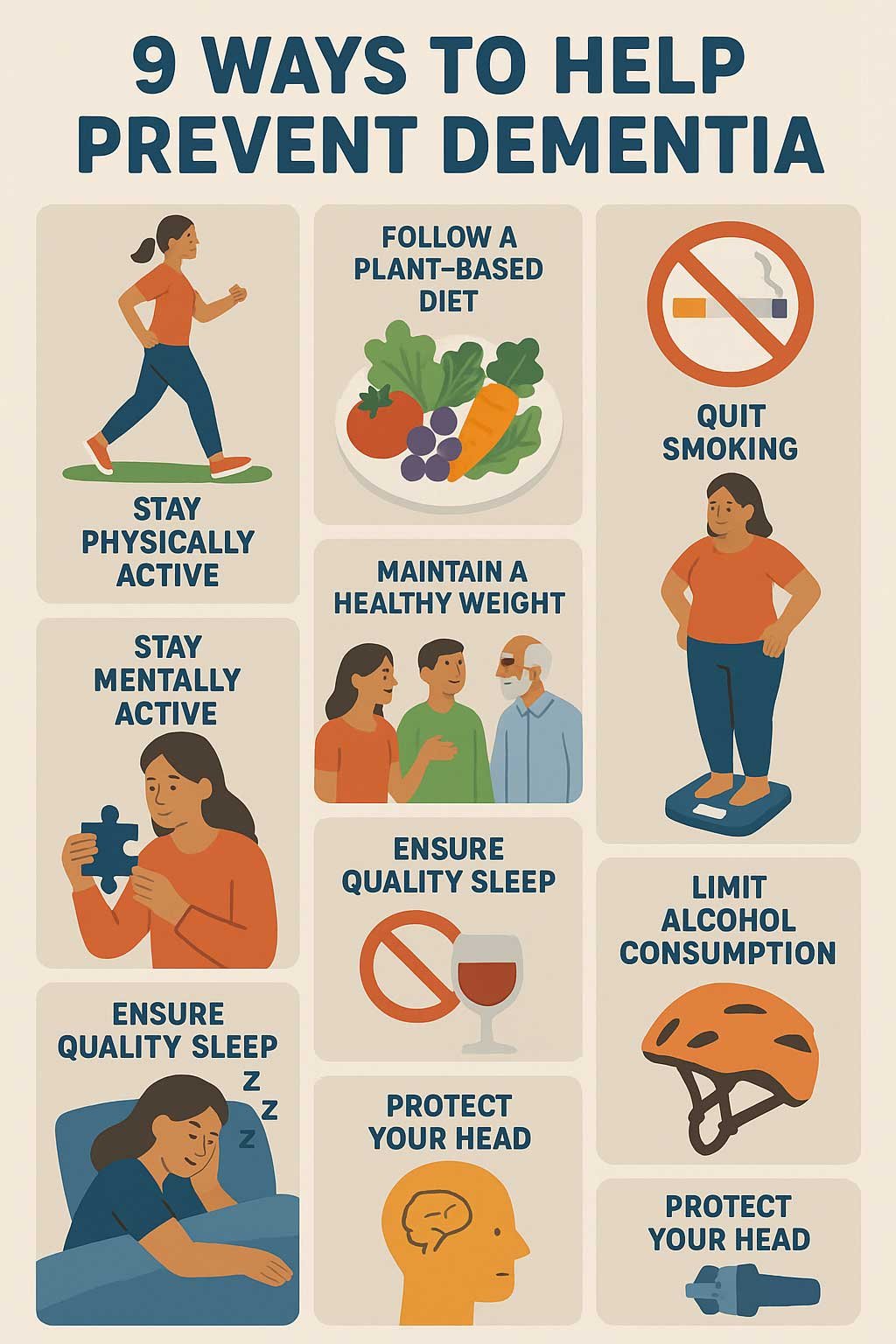Dementia is a broad term describing a variety of cognitive impairments caused by the death or dysfunction of neurons in the brain. This progressive neurological condition manifests as memory loss, behavioral changes, impaired thinking abilities, and difficulties performing everyday tasks. Alzheimer’s disease is the most common form of dementia, accounting for approximately 60-80% of cases. Other types include vascular dementia, dementia with Lewy bodies, and frontotemporal dementia.(1)
Latest Research
Recent research indicates that dementia prevalence is expected to triple by 2060 due to aging populations and lifestyle factors. However, studies increasingly suggest dementia is not merely an inevitable consequence of aging but can often be delayed or even prevented through proactive lifestyle changes and medical interventions. A significant recent study estimates that 30-50% of Alzheimer’s disease cases could be preventable by addressing modifiable risk factors.(2)
Research has underscored a critical link between cardiovascular health and dementia, particularly Alzheimer’s disease and vascular dementia. Factors detrimental to heart health, including hypertension, diabetes, and high cholesterol, have been found to also increase dementia risk. Thus, promoting cardiovascular health through lifestyle changes significantly reduces dementia risk. (3)
Risk Factors for Dementia
Risk factors for dementia fall into two categories: non-modifiable and modifiable.
Non-modifiable risk factors:
- Age: Risk increases substantially with age, particularly after 65. (4)
- Genetics: Specific rare genetic mutations are associated with early-onset Alzheimer’s disease. (5)
- Family History: Individuals with family members who have dementia face a higher risk, though the underlying mechanisms remain unclear. (6)
Modifiable risk factors:
- Cardiovascular Health: High blood pressure, diabetes, and obesity can impair brain function. (7)
- Lifestyle Choices: Smoking, physical inactivity, poor diet, excessive alcohol consumption, and social isolation significantly increase dementia risk. (8)
9 Steps to Help Prevent Dementia
Recent studies indicate that integrating these lifestyle practices can significantly reduce the risk of dementia:
1. Stay Physically Active: Regular physical activity (e.g., walking, cycling, gardening, yoga, tai chi) for at least 30 minutes daily promotes healthy brain blood flow and neurogenesis. (9)
2. Follow a Plant-Based Diet: Consuming foods rich in antioxidants, vitamins, and healthy fats—such as berries, leafy greens, nuts, seeds, and whole grains—has been linked to better cognitive outcomes. Diets high in saturated and trans fats (common in dairy, meat, fried foods, pastries) are associated with cognitive decline. (10)
3. Quit Smoking: Smoking cessation significantly reduces the risk of developing dementia by improving cardiovascular and overall health. (11)
4. Maintain a Healthy Weight: Obesity, particularly during midlife, increases dementia risk. Maintaining a healthy body weight reduces strain on the cardiovascular system and brain health. (12)
5. Stay Socially Active: Engaging in social activities, volunteering, or participating in community groups fosters cognitive resilience and may delay dementia onset. (13)
6. Stay Mentally Active: Regular mental stimulation through activities such as puzzles, language learning, reading, or strategy games strengthens cognitive reserve and helps maintain brain health. (14)
7. Ensure Quality Sleep: Adequate sleep (7-8 hours nightly) supports cognitive functions, clears toxins from the brain, and lowers dementia risk. Poor sleep patterns are associated with increased risk of dementia. (15)
8. Limit Alcohol Consumption: Excessive alcohol intake is linked to brain damage and increased dementia risk. Moderation or abstinence is advisable. (16)
9. Protect Your Head: Prevent traumatic brain injuries by using seatbelts, wearing helmets during sports, and implementing safety measures at home to reduce fall risks. (17)

Mindful Eating and Supplements
Mindful eating practices emphasize the importance of vitamin B12 supplementation to support nerve function, particularly important for those following plant-based diets. However, supplements containing iron and copper should be avoided unless medically advised, as these can negatively impact brain health. Additionally, choosing aluminum-free cookware and baking powders can further safeguard brain function. (18)
Integrating these lifestyle modifications holistically enhances their protective effect, promoting optimal cognitive health and potentially reducing dementia prevalence significantly.
References:
Physicians Committee for Responsible Medicine. “Diet and Alzheimer’s Disease.” PCRM, 2023
Alzheimer’s Association. “What Is Dementia?” Alzheimer’s Association, 2024. https://www.alz.org/alzheimers-dementia/what-is-dementia.
Livingston, Gill, et al. “Dementia prevention, intervention, and care: 2020 report of the Lancet Commission.” Lancet 396, no. 10248 (2020): 413-446.
World Health Organization. “Risk Reduction of Cognitive Decline and Dementia.” WHO Guidelines, 2019.
Alzheimer’s Society. “Risk factors for dementia.” Alzheimer’s Society UK, 2023. https://www.alzheimers.org.uk.
Bird, Thomas D. “Genetic Factors in Alzheimer’s Disease.” New England Journal of Medicine 379, no. 7 (2018): 648-659.
Loy, Clement T., et al. “Genetics of dementia.” The Lancet Neurology 13, no. 10 (2014): 1019-1031.
Gorelick, Philip B., et al. “Vascular contributions to cognitive impairment and dementia.” Stroke 42, no. 9 (2011): 2672-2713.
Sabia, Séverine, et al. “Association of ideal cardiovascular health at age 50 with incidence of dementia: 25-year follow-up of Whitehall II cohort study.” BMJ 366 (2019): l4414.
Erickson, Kirk I., et al. “Physical activity and brain plasticity in late adulthood.” Neuroscience & Biobehavioral Reviews 33, no. 8 (2009): 1075-1086.
Barnard, Neal D., et al. “Dietary and lifestyle guidelines for the prevention of Alzheimer’s disease.” Neurobiology of Aging 35, suppl. 2 (2014): S74-S78.
Zhong, Guohua, et al. “Smoking is associated with an increased risk of dementia: a meta-analysis of prospective cohort studies.” PLOS ONE 10, no. 3 (2015): e0118333.
Whitmer, Rachel A., et al. “Obesity in middle age and future risk of dementia: a 27-year longitudinal population-based study.” BMJ 330, no. 7504 (2005): 1360.
Fratiglioni, Laura, et al. “Influence of social network on occurrence of dementia.” Lancet 355, no. 9212 (2000): 1315-1319.
Stern, Yaakov. “Cognitive reserve in ageing and Alzheimer’s disease.” Lancet Neurology 11, no. 11 (2012): 1006-1012.
Ju, Yo-El S., et al. “Sleep and Alzheimer’s disease pathology—a bidirectional relationship.” Nature Reviews Neurology 10, no. 2 (2014): 115-119.
Schwarzinger, Michaël, et al. “Contribution of alcohol use disorders to the burden of dementia in France.” Lancet Public Health 3, no. 3 (2018): e124-e132.
Li, Yulin, et al. “Head injury and dementia: a meta-analysis.” Journal of Neurology, Neurosurgery & Psychiatry 88, no. 1 (2017): 2-9.
